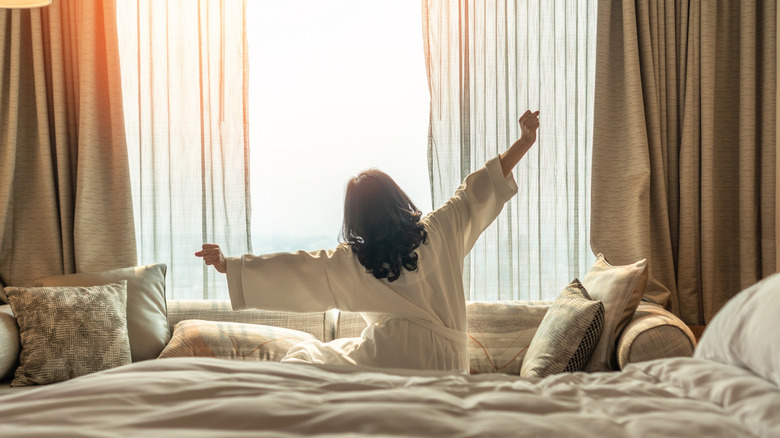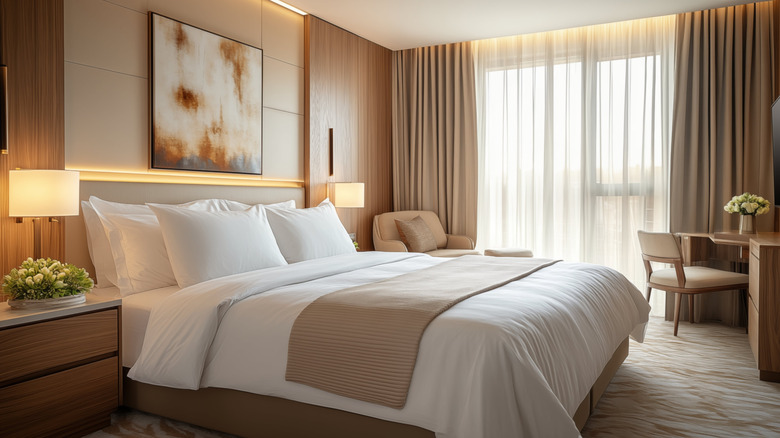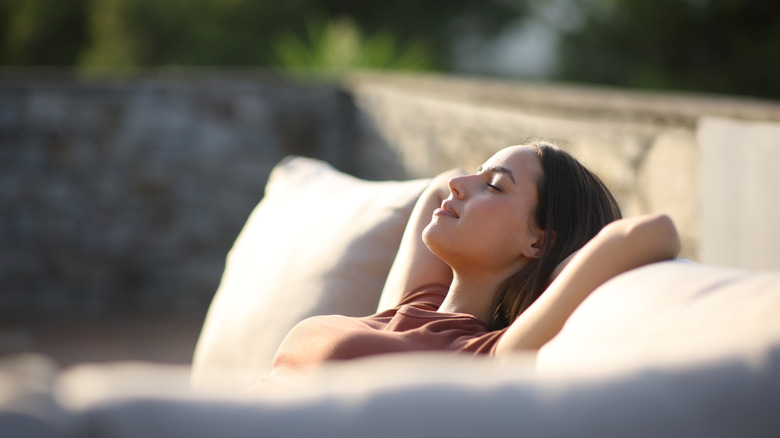The Scientific Reasons You Sleep Better In A Hotel
For many of us, sleeping well in a hotel is something we may take for granted, as it may go against human nature. We are actually wired not to sleep deeply in unfamiliar environments. Several studies have noted the "first-night effect" — a phenomenon where people don't have restful sleep on the first night in a new environment since part of the brain stays awake to be on guard, a kind of evolutionary safeguard against potential attackers. Today, even though there's no danger, people find it difficult to be completely relaxed when they first try and sleep in a new place.
If this is true, then why do we often sleep better in a hotel room that we've never been in, surrounded by strangers, in a new city, than we do at home? While it seems counterintuitive, hotels work hard to help you sleep better. Your room's lighting, temperature, layout, bedding, and sound insulation are all geared towards undisturbed sleep. To really commit to your rest, there are even hacks to help you sleep soundly in your hotel.
In a survey of 2,000 adults, about 73% confirmed that they sleep better in hotels (via Forbes). Reasons ranged from fewer noise interruptions to being able to escape worries and responsibilities that often keep people up at night. Some even credited hotel amenities like the pool or gym to get them tired enough to sleep deeply. Now, properties are going even further in the quest to offer guests a restful night, giving rise to sleep tourism.
Hotels take sleep seriously
Hotels aim to approach rest through multiple strategies, while a home bedroom tends to have many distractions that can detract from sleep. A major factor is the quality of bedding. Mattresses used by hotels are of a much higher quality, offering better body support and breathability for better temperature management. Several hotel brands, like the Four Seasons, Marriott, and the Ritz-Carlton, actually sell mattresses and bedding. While you shouldn't expect it to be cheap, this makes it possible to have a hotel-quality mattress at home. Fresh sheets and good pillows are equally important.
A hotel room's broader environment is also curated for better sleep, with blackout curtains and at least some amount of noise reduction. Lighting is generally warm, with the possibility of being lowered; if there's no dimmer, you'll notice that the hotel room will invariably have multiple lights in the room, so guests can choose how bright or dim they want their surroundings. Hotel air conditioning also plays a role — people generally sleep better at around 65 degrees Fahrenheit, and hotel air conditioners, in addition to being able to keep things comfortably cool, have the added advantage of providing white noise, which can help with sleep. Of course, many hotels now offer white noise machines to help drown out potential external sounds and aid good sleep.
Sleep tourism is on the rise
While most hotels follow general protocols of ensuring their guests get a good night's sleep, some go much further. Travelers have started flocking to "sleep tourism" hotspots like Leavenworth in the Pacific Northwest, where a large percentage of accommodations have a spa. As the focus on good sleep grows, properties have started specializing in it, with many offering stays that take a holistic approach to wellness through good sleep. Meditation, yoga, and herbal baths are all part of extended sleep programs that guests can opt into. Several properties also offer personalized packages to help fix a guest's sleep cycle by encouraging morning walks. The Park Hyatt in New York even offers AI-powered mattresses and aromatic oil diffusers to aid sleep.
Having sleep specialists on the property has also become the norm in many sleep tourism destinations. Some luxurious capsule hotels not only curate the guest's pod with relaxing sounds and award-winning bedding, but they might also have a sleep coach on hand for consultations. More intensive properties blur the lines between hotels and clinics, like Spain's SHA Wellness Clinic, offering personalized treatments after monitoring a guest's sleep patterns.
It's not all simply wellness, as some places are starting to explore more fun aspects of sleep tourism. The Kimpton Fitzroy hotel in London offers a Room To Dream Experience, which comes with various sleeping aids like herbal teas, pillow sprays, a dream journal, and a headset to help guests have lucid dream experiences. The package also includes an AI artist who will visually recreate your dreams, literally taking sleep tourism to the next level.


